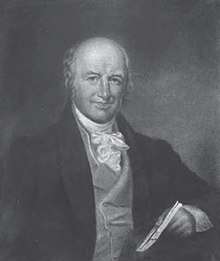Robert Lenox
Robert Lenox (December 31, 1759 – December 13, 1839) was a Scottish-American merchant who served as the 15th president of the Saint Andrew's Society of the State of New York.[1]
Robert Lenox | |
|---|---|
 | |
| 15th President of the Saint Andrew's Society of the State of New York | |
| In office 1798–1814 | |
| Preceded by | Walter Rutherfurd |
| Succeeded by | James Tillary |
| Personal details | |
| Born | December 31, 1759 Kirkcudbright, Scotland |
| Died | December 13, 1839 (aged 79) New York City, New York, U.S. |
| Spouse(s) | Rachel Carmer
( m. 1783; |
| Children | 12, including James Lenox |
Early life
Lenox was born on December 31, 1759 in the seaport town of Kirkcudbright on the southwest border of Scotland. He was one of eleven children born to James Lenox and Elizabeth (née Sproat) Lenox.[2]
His paternal grandfather was William Lennox and his maternal grandfather was David Sproat, both from the parish of Kirkcudbright in Scotland.[2]
Career
Just before the Revolutionary War, he emigrated to America with his brothers David and William. They first went to their uncle, David Sproat, a merchant in Philadelphia, who had come to America in 1760. His uncle join the British Army at New York, and was appointed Commissary-General of Naval Prisoners in North America in the Autumn of 1779. His brother William was appointed British Commissary of Naval Prisoners in the South, based in Charleston, where he died in 1781. After schooling in Burlington, New Jersey, Robert joined his uncle and brother William in New York in 1783 where he was employed as clerk, and became "director of Flags of Truce."[3][4]
His other brother David joined the Continental Army and was a major by the end of the war. After the War, David became a merchant in Philadelphia, where he died in 1828.[2]
Shortly after the end of the War, Robert was joined by James Lenox, his youngest brother who came from Scotland, and established the merchant house of Jas. Lenox & Wm. Maitland in 1796. James retired from the firm in 1818 and returned to Scotland, where he died in 1839. The firm later became known as Kennedy & Maitland, Maitland, Phelps & Co., and later Maitland, Coppell & Co.[2]
Personal life
On September 1, 1783, Lenox was married to Rachel Carmer (1763–1843). Rache was the daughter of Nicholas Carmer, a New York cabinet maker. Together, they were the parents of twelve children, but only six, five girls and one boy, lived to maturity:[2]
- Elizabeth Sproat Lenox (1785–1864), who married Robert Maitland.[2]
- Isabella Henderson Lenox (1789–1866), who married William Banks.[2]
- David Sproat Lenox (1790–1792), who died in infancy.[2]
- Rachel Carmer Lenox (1792–1875), who married her cousin, David Sproat Kennedy (1791–1853).[5]
- Charlotte Murdoch Lenox (1794–1807), who died in childhood.[2]
- Alethea Carmer Lenox (1797–1806), who died in childhood.[2]
- Robert Lenox (1797–1798), who died in infancy.[2]
- Jennet Lenox (1798–1870), who died not marry.[2]
- James Lenox (1800–1880), a philanthropist and who did not marry.[6]
- Mary Lenox (1803–1886), who married John Fisher Sheafe.[2]
- Henrietta Anderson Lenox (1804–1886).[7]
- Alethea Lenox (1807–1878), who married James Donaldson, brother of banker Robert Donaldson Jr.[8]
Lenox died at his residence, 59 Broadway in New York City on December 13, 1839. Upon his death, he left a fortune of over one million dollars and 30 acres of land between Fourth and Fifth Avenues to his only son,[9] who by 1855 was the third richest man in New York.[10]
References
- Saint Andrew's Society of the State of New York (1911). Roster of Saint Andrew's Society of the State of New York with Biographical Data. D. Taylor. Retrieved 26 July 2019.
- Morrison, George Austin (1906). History of Saint Andrew's Society of the State of New York, 1756-1906. New York: Saint Andrew's Society of the State of NY. Retrieved 26 July 2019.
- "Dinner plates (12)". www.nyhistory.org. New-York Historical Society. Retrieved 15 February 2019.
- "Lenox family papers". archives.nypl.org. New York Public Library. Retrieved 15 October 2017.
- Reynolds, Cuyler (1914). Genealogical and Family History of Southern New York and the Hudson River Valley: A Record of the Achievements of Her People in the Making of a Commonwealth and the Building of a Nation. Lewis Historical Publishing Company. p. 1294. Retrieved 15 February 2019.
- "DEATH OF JAMES LENOX; THE END OF A PHILANTHROPIC LIFE. THE RECORD OF HIS GENEROUS PUBLIC AND PRIVATE CHARITIES--THE LENOX LIBRARY--A MAN WHO LOVED HIS FELLOWMEN". The New York Times. 19 February 1880. Retrieved 15 October 2017.
- "MISCELLANEOUS CITY NEWS; THE WILL OF JAMES LENOX. A PHILANTHROPIC PROVISION MADE FOR THE LIBRARY BEARING HIS NAME". The New York Times. 25 March 1880. Retrieved 15 October 2017.
- "Alethea Lenox (1807-1878)". www.nyhistory.org. New-York Historical Society. Retrieved 30 July 2019.
- Miller, Tom (12 August 2013). "Daytonian in Manhattan: The Lost Lenox Mansion -- No. 53 5th Avenue". Daytonian in Manhattan. Retrieved 15 October 2017.
- Bancroft, Hubert Howe (2015). The Book of Wealth: A Study of the Achievements of Civilization. Achievements of Civilization. p. 745. Retrieved 15 October 2017.